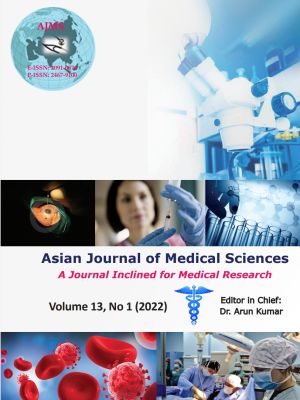Cognitive deterioration in association with teeth loss in elderly population: A study from Eastern India
Keywords:
Chewing ability, Cognitive impairment, Elderly, Mini-mental state examination, Tooth lossAbstract
Background: With the global increase in cognitive impairment and dementia, the need to investigate into the possible ways that can be used to prevent or delay such occurrence has been growing. Maintenance of dental care and oral hygiene has been promoted as one such aspect.
Aims and Objectives: To study the association between cognitive impairment in patients without registered diagnosis of dementia with tooth loss and chewing ability.
Materials and Methods: It was a cross-sectional hospital-based study where consenting elderly persons attending Dental outpatient department over 1½ years were included. Data obtained on socio-demographic details, number of tooth loss, number of remaining teeth, subjective chewing ability, cognitive assessment as per mini-mental state examination (MMSE), and Clock Drawing Test were analyzed statistically to check correlational association.
Results: In this study 96 eligible elderly persons of mean age of 68.30±6.28 years showed increased cognitive impairment among females (P=0.003), increased age (P=0.009), rural background (P=0.033) and low income groups (P=0.001). Positive correlation was found between chewing capacity (P=0.348), number of remaining teeth (r=0.418) with MMSE scores.
Conclusion: Our study population showed positive correlation between impaired cognition and the number of extracted tooth and chewing capacity. With further study on wider and representative population, we hope to project the role of maintaining good oral hygiene and dental care as a possible preventive strategy among many others to combat the increased burden of cognitive impairment.
Downloads
Downloads
Published
How to Cite
Issue
Section
License
Copyright (c) 2021 Asian Journal of Medical Sciences

This work is licensed under a Creative Commons Attribution-NonCommercial 4.0 International License.
Authors who publish with this journal agree to the following terms:
- The journal holds copyright and publishes the work under a Creative Commons CC-BY-NC license that permits use, distribution and reprduction in any medium, provided the original work is properly cited and is not used for commercial purposes. The journal should be recognised as the original publisher of this work.
- Authors are able to enter into separate, additional contractual arrangements for the non-exclusive distribution of the journal's published version of the work (e.g., post it to an institutional repository or publish it in a book), with an acknowledgement of its initial publication in this journal.
- Authors are permitted and encouraged to post their work online (e.g., in institutional repositories or on their website) prior to and during the submission process, as it can lead to productive exchanges, as well as earlier and greater citation of published work (See The Effect of Open Access).




